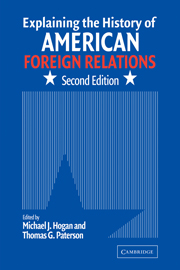Book contents
- Frontmatter
- Contents
- Preface to the Second Edition
- Contributors
- 1 Introduction
- 2 Defining and Doing the History of United States Foreign Relations : A Primer
- 3 Toward a Pluralist Vision : The Study of American Foreign Relations as International History and National History
- 4 Theories of International Relations
- 5 Bureaucratic Politics
- 6 Psychology
- 7 National Security
- 8 Corporatism
- 9 World Systems
- 10 Dependency
- 11 Considering Borders
- 12 The Global Frontier : Comparative History and the Frontier-Borderlands Approach
- 13 Modernization Theory
- 14 Ideology
- 15 Culture and International History
- 16 Cultural Transfer
- 17 Reading for Meaning : Theory, Language, and Metaphor
- 18 What's Gender Got to Do with It? Gender History as Foreign Relations History
- 19 Race to Insight: The United States and the World, White Supremacy and Foreign Affairs
- 20 Memory and Understanding U.S. Foreign Relations
- Index
16 - Cultural Transfer
Published online by Cambridge University Press: 05 June 2012
- Frontmatter
- Contents
- Preface to the Second Edition
- Contributors
- 1 Introduction
- 2 Defining and Doing the History of United States Foreign Relations : A Primer
- 3 Toward a Pluralist Vision : The Study of American Foreign Relations as International History and National History
- 4 Theories of International Relations
- 5 Bureaucratic Politics
- 6 Psychology
- 7 National Security
- 8 Corporatism
- 9 World Systems
- 10 Dependency
- 11 Considering Borders
- 12 The Global Frontier : Comparative History and the Frontier-Borderlands Approach
- 13 Modernization Theory
- 14 Ideology
- 15 Culture and International History
- 16 Cultural Transfer
- 17 Reading for Meaning : Theory, Language, and Metaphor
- 18 What's Gender Got to Do with It? Gender History as Foreign Relations History
- 19 Race to Insight: The United States and the World, White Supremacy and Foreign Affairs
- 20 Memory and Understanding U.S. Foreign Relations
- Index
Summary
Since World War II, the analysis of cultural transfer has formed a powerful tool for the investigation of the United States' interaction with other nations. But unlike other approaches discussed in this volume, scholars have never devised a clear-cut terminology. Nor have they agreed on a single line of argument. Originating in political think tanks, the analysis of cultural transfer has meandered through university departments around the globe before finally reaching the public sphere, in the 1980s. By far the most pervasive concept has been “cultural imperialism,” a term and an ideology that gained a considerable amount of momentum in the 1960s and after, and that due to its longevity and powerful impact deserves our attention. Recently, however, scholars from a variety of disciplines suggested that the term “cultural imperialism” should be replaced with a broader, more inclusive word that avoids the simplistic active-passive dominator-victim dualism such as “cultural transmission.”
What does cultural transfer mean? Cultural transfer does not form a single, static “school” or a set of criteria. Similar to the New Left historians, most historians of cultural transfer probably would deny that they all belong to one school. The specific meaning of the term is not timeless but generated out of its various discourses, its use. In the past fifty years, the research on cultural transfer has been subjected to cycles, thus its significance must be viewed through historical lenses. First, the “cold warriors” lamented the absence of an aggressive cultural foreign policy among U.S. officials.
- Type
- Chapter
- Information
- Explaining the History of American Foreign Relations , pp. 257 - 278Publisher: Cambridge University PressPrint publication year: 2004
- 3
- Cited by



